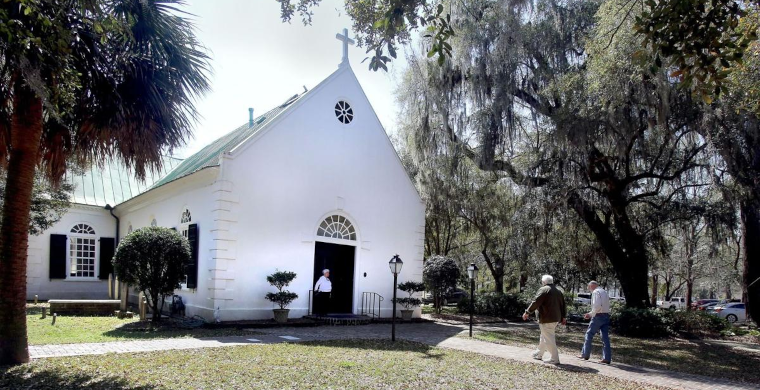Parishes that split from SC Episcopal Church hopeful they could keep properties after all
Old St. Andrew's Parish Church - photo File/Brad Nettles/Staff.
By Rickey Ciapha Dennis Jr.
www.postandcourier.com
June 8, 2022
Old St. Andrew's Parish Church in West Ashley is one of seven congregations that petitioned for rehearing following the South Carolina Supreme Court's April 20, 2022, decision ordering the church to hand over its property.
Following a June 7 order by the S.C. Supreme Court, some congregations that broke away from the Episcopal Church are optimistic they could end up keeping their properties after all.
On April 20, the state's top court ordered that 14 of the 29 congregations that split from the Episcopal Diocese of South Carolina were to hand over the properties to the Episcopal Church. It appeared that the court's decision put an end to a decadelong legal battle over the ownership of dozens of church properties valued at roughly $200 million.
But in a stunning development Tuesday, the state's top court did not deny petitions for rehearing submitted by seven of those churches. Instead, the court requested that the Episcopal Church respond by June 20 to the arguments made by the seven parishes.
The court's order gives hope to some of the breakaway parishes, which fall within the Anglican Diocese of South Carolina umbrella, that they could, in fact, retain their valuable religious facilities.
"We are encouraged by the recent development from the South Carolina Supreme Court and are buoyed by the hope that seven more of our parishes might keep their properties," said Bishop Chip Edgar of the Anglican Diocese. "But in all these legal matters, we are keeping our eyes focused on our Lord Jesus and the work he has called us to -- to glorify God in worship and in our lives, to proclaim his name, to build up the church, and to love our neighbors as Christ loves us."
The seven churches are Old St. Andrew's in West Ashley, Church of the Good Shepherd in West Ashley, Church of the Holy Cross in Stateburg, Church of the Holy Comforter in Sumter, St. Jude's Church in Walterboro, St. Luke's Church in Hilton Head, and Trinity Church in Myrtle Beach.
An eighth church, Christ Church in Mount Pleasant, also petitioned for rehearing. But that petition was denied in its entirety.
"Today, we feel cautiously optimistic and hopeful," said the Rev. Marshall Huey, pastor of Old St. Andrew's. "We have prayed fervently for this. ... This is a wonderful development for us. Our legal counsel has been wonderful in guiding us through this process."
Meanwhile, on June 8, the Supreme Court finalized its decision to return seven congregations to the Episcopal Church: Holy Trinity in Charleston, St. Bartholomew's in Hartsville, St. David's in Cheraw, St. James on James Island, St. John's on Johns Island, St. Matthew's in Fort Motte, and Christ Church in Mount Pleasant.
"We continue to move forward prayerfully in the hope and expectation of full resolution," said Bishop Ruth Woodliff-Stanley of the Episcopal Diocese of South Carolina.
The court said in its April decision that 14 churches, including the seven petitioning for rehearing, did expressly agree to an Episcopal Church law that places all parish properties in a trust belonging to the national church.
Now, the seven churches are arguing that they never agreed to be part of the Episcopal Church's trust, implying the individual congregations should retain ownership of their properties.
The churches' second argument is that if a trust was in fact established, then it was legally revoked when the congregations adjusted their governing documents to sever ties with the Episcopal Church.
The court's April ruling also said 15 breakaway churches can retain their property since the congregations never explicitly conceded to the church law, known as the 1979 Dennis Canon.
The schism between the two groups boiled over in 2012 after years of arguments within the Episcopal Church over gay rights, scriptural interpretations and governance powers.
This latest development draws out a legal dispute that appeared resolved.
In the April decision, Justice John Few wrote that the ruling was final. "From our decision today, there will be no remand," Few said. "The case is over."
The additional orders this week indicate this long-fought feud will continue.
END














